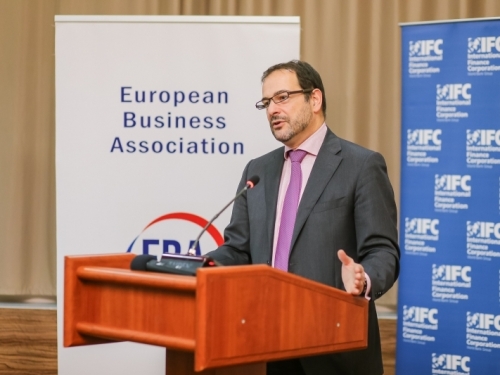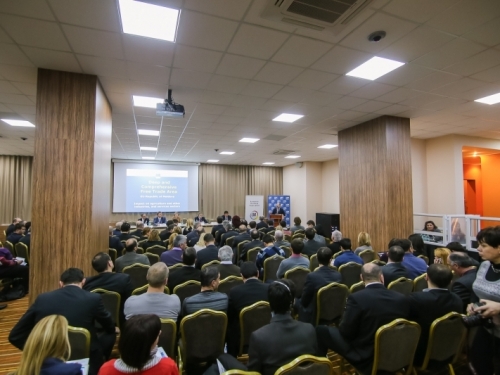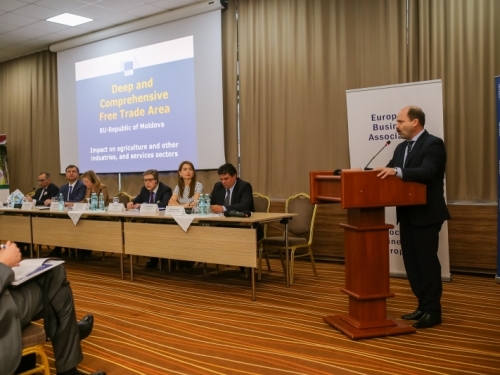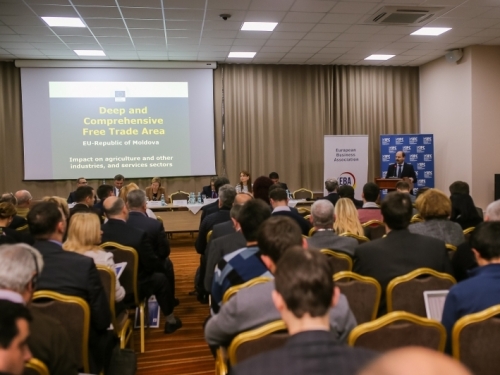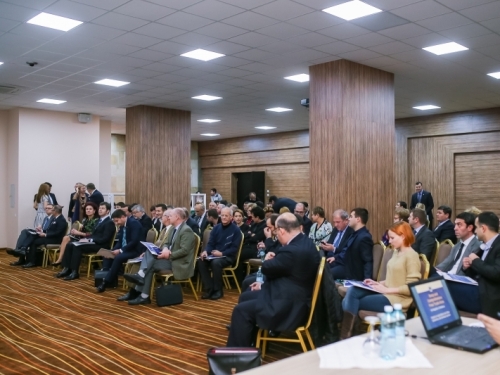16 december 2013, Chișinău - The impact of the Deep and Comprehensive Free Trade Agreement RM-EU (DCFTA) on the business environment of Republic of Moldova was the subject which gathered representatives of Government institutions, diplomatic missions, professional associations and over 120 businessmen and journalists. The recently held event was organized by the European Business Association in collaboration with Ministry of Economy of the RM and International Finance Corporation (IFC), focused on „The deep and Comprehensive Free Trade Agreement - recent evolutions." Along with the, Viceprime-minister, minister of Economy, Valeriu Lazăr, the chief negotiator on the behalf of European Comission, Luc Devigne, the chief negoatiator of the RM, Viceminister of Economy Octavian Calmac, Head of the EU Delegation in Chișinău, Pirkka Tapiola, ambassador of Kingdom of Sweden Mrs Ingrid Tersman, have participated at the event.
At the opening of the event, Deputy Prime Minister, minister of Economy, Valeriu Lazăr, welcomed the initiative of conducting such an event dedicated to raising awareness on the content of the DCFTA and its impact upon the business environment. Reiterating that the private sector is the engine of the economic development, Valeriu Lazăr claimed that the process of european integration is a transformational process for RM, which comprises each economic agent.
"The European economic model will allow to realize the potential of development through emphasizing each opportunity that the European market is offering, which highlights the highest quality standards and level of social responsibility. Through their implementation, we will improve the competitiveness. When we become competitive on the EU market, we will have a rise of competitiveness on other markets too." mentioned the Ministry of Economy.
Referring to the challenges generated by the implementation of the Agreement, Valeriu Lazăr alleged the actions of the Road map regarding competitivity, document elaborated by Ministry of Economy for solving them. In the same context, his excelency mentioned that this document aimes each sector in particular, seeking to maximise the positive effect of the Agreement and minimise the negative impact.
On hist turn, the chief negociator on behalf of European Comission, Luc Devigne, also present at the event, reiterated the comparative advantages of DCFTA in comparison with preferential trade regime. The official also mentioned that the agricultural sector must firstly align its national standards to those of EU. In this direction, Moldova benefited of 41 mln Euro during 2011-2013, directed for the implementatio of DCFTA, the agricultural sector being of top priority. „The investments necessary for the implementation of DCFTA do not represent just costs, but a long-term benefit. As an impact from its implementation, Moldova will have to benefit from the technological transfer, modernizing and upgrading of production, products at a low cost imported from EU, reducing the import duties for imports, financial support from the EU for implementing the agreement and so on" mentioned Luc Devigne.
HE Mr Pirkka Tapiola, Head of the EU Delegation in Chișinău as well as Ingrid Tersman, the Ambassador of Kingdom of Sweden in RM, sustained the efforts of Government of RM in implementing the necessary reforms and reiterated the stringent need of reforming justice system and reducing corruption, which will lead to establishing of a durable platform for development of the country as a whole.

